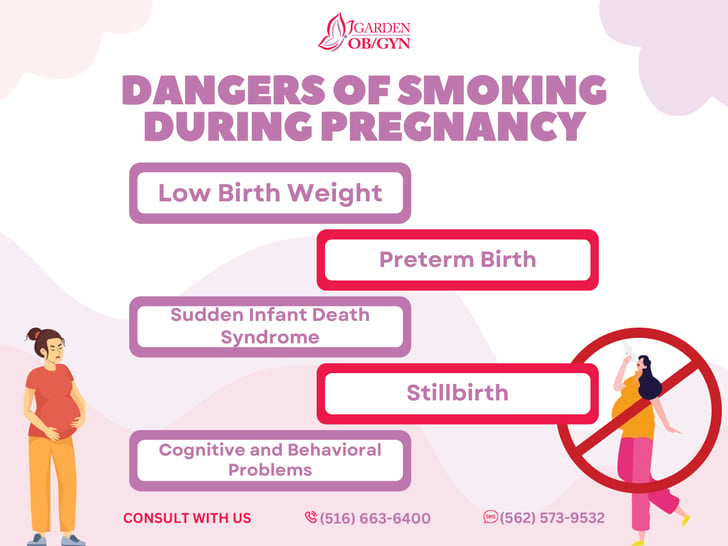Dangers of Smoking during Pregnancy
Pregnancy is a transformative journey, but smoking's impact is profound. Explore how it harms maternal and fetal health, emphasizing the importance of quitting for a healthy pregnancy.

Pregnancy is a remarkable and transformative journey for women, marked by numerous physical and emotional changes. It is a time when a mother's health choices can significantly affect the well-being of both herself and her developing baby. One such choice that has garnered considerable attention over the years is smoking. The impact of smoking on pregnancy is profound and far-reaching, with detrimental effects that can have lifelong consequences for both mother and child. In this article, we will explore the various ways smoking during pregnancy can harm maternal and fetal health, and why quitting smoking is crucial for a healthy pregnancy.
The Harms of Smoking During Pregnancy
-
Low Birth Weight: Smoking during pregnancy is a major contributor to low birth weight, a condition in which a baby is born weighing less than 5.5 pounds (2.5 kilograms). Low birth weight is associated with an increased risk of various health problems, including respiratory distress syndrome, infections, and developmental delays. Babies born with low birth weight are also more likely to face long-term health issues, such as obesity and cardiovascular disease.
-
Preterm Birth: Smoking is a leading cause of preterm birth, which occurs when a baby is born before completing 37 weeks of gestation. Preterm birth can lead to a host of complications, including breathing difficulties, developmental delays, and an increased risk of infection. In severe cases, it can even be life-threatening for the newborn.
-
Stillbirth: Smoking during pregnancy increases the risk of stillbirth, which is the loss of a baby before birth. The toxins in cigarette smoke can restrict oxygen flow to the baby, leading to complications that may result in stillbirth. This is a devastating outcome for any expecting parent.
-
Sudden Infant Death Syndrome (SIDS): Babies born to mothers who smoked during pregnancy are at a higher risk of Sudden Infant Death Syndrome (SIDS). SIDS is the unexplained death of an otherwise healthy baby during sleep. Smoking exposes infants to secondhand smoke, which can irritate their delicate respiratory systems and increase the risk of SIDS.
-
Developmental and Behavioral Issues: Smoking during pregnancy has been linked to an increased risk of developmental and behavioral problems in children. These issues may manifest as attention deficit hyperactivity disorder (ADHD), learning disabilities, and behavioral disorders.
Why Does Smoking Harm Pregnancy?
The harmful effects of smoking during pregnancy can be attributed to the more than 7,000 chemicals found in cigarette smoke. Nicotine, carbon monoxide, and various carcinogens are particularly detrimental. These substances can:
-
Restrict Oxygen: Nicotine constricts blood vessels, reducing the amount of oxygen that reaches the placenta and the developing fetus.
-
Increase Heart Rate: Nicotine also increases the baby's heart rate, putting additional stress on the developing cardiovascular system.
-
Damage DNA: The chemicals in cigarette smoke can damage the DNA in both maternal and fetal cells, increasing the risk of birth defects and developmental issues.
-
Disrupt Hormones: Smoking disrupts the delicate hormonal balance required for a healthy pregnancy, potentially leading to complications.
The Importance of Quitting Smoking During Pregnancy
The good news is that quitting smoking during pregnancy can have immediate and long-term benefits for both the mother and the baby. When a woman stops smoking:
-
Improved Oxygen Flow: Oxygen levels in the mother's blood rise, providing better nourishment to the baby.
-
Reduced Risks: Quitting smoking decreases the risk of preterm birth, low birth weight, and stillbirth, giving the baby a better chance of a healthy start in life.
-
Healthier Childhood: Children born to mothers who quit smoking during pregnancy are less likely to face developmental and behavioral problems.
-
Postpartum Health: Quitting smoking during pregnancy can also motivate the mother to remain smoke-free after childbirth, promoting a healthier family environment.
The impact of smoking on pregnancy is clear, and it is a risk that should not be taken lightly. Smoking during pregnancy poses a multitude of dangers to both the mother and the developing baby, with potential lifelong consequences. However, the decision to quit smoking can lead to immediate and long-term benefits, fostering a healthier start for the child and a brighter future for the entire family. Pregnant women who smoke should seek support and resources to help them quit smoking, not only for their sake but for the well-being of their precious little one. A smoke-free pregnancy is a step toward a healthier and happier family.
































